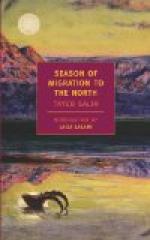CHAPTER XIV
MORALIZING UNDER THE MIDNIGHT SUN
“Into this Universe, and Why not knowing
Nor Whence, like Water willy-nilly flowing,
And out of it, as Wind along the Waste,
I know not Whither, willy-nilly blowing.”
—The Rubaiyat.
The Midnight Sun! The sun does not sink to the horizon, but pauses for a moment and rises again. Dawn and eventide are one. The manifestations of light ever since we left Athabasca Landing have been wonderful, uplifting. The supreme marvel of the Midnight Sun is not what we see but what we feel. Standing at this outpost of Britain’s Empire, we give our imagination rein and see waking worlds and cities of sleep. As this red sun rises from its horizon-dip, it is the first of the unnumbered sunrises which, as hour follows hour, will come to the continents. Longfellow says:
“Think, every morning where the sun peeps through
The dim, leaf-latticed windows of the grove,
How jubilant the happy birds renew
Their old, melodious madrigals of love!
And when you think of this, remember too
’Tis always morning somewhere, and above
The awakening continents, from shore to shore,
Somewhere the birds are singing evermore.”
[Illustration: Home of Mrs. Macdonald.]
How do the people of Macpherson divide into day and night their largesse of light? By common consent four o’clock in the morning seems to be bedtime, and by four in the afternoon people are busying themselves with breakfast. In Polar Circles, do as the Polars do, is good advice, and we follow suit. Individuality is strongly marked at this metropolis on the Peel. Every one you meet is a mine of interest, and sharp contrasts present themselves. Mrs. Macdonald discusses fur and deer-meat with Jack Johnson. He is a trapper who plays the game alone and who last year was reduced to killing his favourite dog for food. Current report credits him with having “killed his man in the Yukon.” Mrs. Macdonald is a Loucheux woman who, at the age of fourteen or fifteen, married Archdeacon Macdonald of the English Church and for eight long years afterwards assisted him in his life work of translating the Gospels into the Loucheux language. She has come all the way from Winnipeg to the Arctic Circle to spend the summer visiting her people. We lose our hearts to her two sons, splendid fellows both.
It is the Eskimo who brings both missionary and trader to Fort McPherson. Are these Eskimo, Christians? Are they civilised? These are the questions that confront us when we speak of these Farthest North Canadians. It is an age of classification. You cannot find a flower nowadays that some one has not tacked a Latin name to, and it goes by inverse ratio—the smaller the flower the longer the name. Every bird you hear sing, even though it stop but an hour to rest its tired pinion on its




